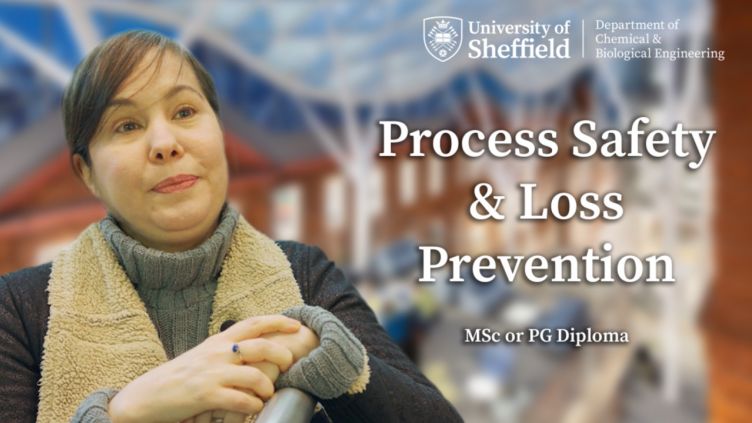Process Safety and Loss Prevention MSc(Eng)
School of Chemical, Materials and Biological Engineering,
Faculty of Engineering
-
Start date
September 2025 -
Duration
1 year 2 years -
Attendance
Full-time Part-time
Explore this course:
Apply now for 2025 entry or register your interest to find out about postgraduate study and events at the University of Sheffield.

Course description
Whether you’re already working in the field or just starting out, this course will deepen your understanding and equip you with skills and expertise in process safety, loss prevention and risk assessment. You'll be ready for a career in the oil and gas, chemical, nuclear and pharmaceutical industries or with any of the consultancies that service them.
Reducing risks to employees, the public and the environment from exposure to major hazard events is a high priority for industry. This unique MSc was established over 25 years ago jointly by us, the Institution of Chemical Engineers and the Health and Safety Executive.
We've brought together leading experts with years of experience in oil and gas, chemical, nuclear and pharmaceutical sectors. Many of the course tutors are from industry, with decades of experience and from specialist consultancies, as well as former industry process safety professionals now based at the University.
Accreditation
We are accredited by the Institution of Chemical Engineers on behalf of the Engineering Council for the purposes of partially meeting the academic requirement for registration as a Chartered Engineer.
Modules
Core modules:
- Introduction to Process Safety and Loss Prevention
-
This module provides the background to understanding the importance of Process Safety. It sets out the structure and describes the elements of a modern approach to Process Safety. It provides the basis of how Process Safety should be approached and implemented across the lifecycle of a project, illustrated with practical examples and workshops.
15 credits - Leadership and Management of Process Safety
-
This module provides an overview of Process Safety Management systems. As an exemplar, the twenty element CCPS Process Safety Management model is used as a framework to explore important aspects of process safety such as the commitment to process safety (via leadership and culture), understanding and managing risks and learning from experience. Beyond this, topics such as corrosion and mechanical failure will be introduced to inform decisions around asset integrity.
15 credits - Hazards & Protections
-
The theme of this module is hazard and risk. The interaction between process design and hazard identification is explored. A number of hazard study techniques are introduced and the concepts underlying risk and risk criteria are analysed. Protective systems such as pressure relief and fire protection are reviewed.
15 credits - Human Behaviour and Human Error
-
The theoretical background and practical skills are given for assessing and reducing human error. Features considered include human factors and psychological mechanisms. Human reliability is considered in industry and its impact on major hazard systems and quality assurance. Human-machine interfaces are examined. Approaches are given for improving human reliability and error reduction. Key features include task analysis and its application, the quantification of human error for risk assessment and cost-benefit analysis and the use of data collection systems. Studies identify the underlying reasons for human caused accidents and quality lapses. The module aims to give: an understanding of the importance of humans in the chain of actions leading to accidents in chemical plants, an understanding of the ways in which human error can be described in the operation of a task sequence, an appreciation of the ways in which data can be collected and used in incident investigation and an understanding of the numerical representation of human behaviour in the assessment of risk.
15 credits - Process Safety in the Chemical, Pharma and Fine Chemicals Industry
-
This module addresses process safety in the chemical, pharma and fine chemical industry. It is one of a series of modules which address hazards and risks in specific industries. A wide range of chemical hazards are examined including flammability, toxicity, chemical reactivity and environmental impact. Tools and techniques for identifying hazards and reducing risk are described and practical experience in their use is provided in the form of workshop activities. The module will describe how to prepare a 'basis for safety' for a process.
15 credits - Process Safety in the Oil and Gas Industry
-
The module describes how techniques covered on the rest of the course are applied to process safety issues specific to the oil and gas industry. Within the oil industry it will cover process safety in exploration, production, refining, distribution, marketing and retail operations. Within the gas industry it will address areas such as production, storage, liquefaction and transportation. It will provide the above through the use of a number of discrete case studies.
15 credits - Major Hazards and Emergency Planning
-
The module sets out to provide the methodology for the quantification of the effects of major chemical plant incidents and includes hands-on experience with consequence modelling software. This includes a first principles look at different events and models used to describe events. These range from models of the source of any loss of containment, dispersion of chemicals, fires and explosions. Furthermore, through the use of probits, the effects and consequences of any incidents can be estimated. The module also includes hands-on experience with consequence modelling software. This methodology is placed in the context of the legal requirements for the preparation of safety cases by plant operators. The preparation of Emergency Response Plans is also introduced.
15 credits - Instrumented Systems and Functional Safety
-
The use of computers in control process has resulted in some serious problems in the design and maintenance of safe process systems. An introduction is given to computer architecture. Requirements analysis and systems analysis with supporting tools are described followed by software concepts and tools. Training is given in software and system testing and validation, software maintenance and redesign and the development of fault tolerant systems. The standards required for safety critical instrument systems are examined. Other topics include design, operation and maintenance and safety critical systems. The above material is amplified by appropriate case studies.
15 credits - Research Project
-
The application of scientific and engineering principles to a solution of practical problems of engineering systems and processes is developed throughout the course and demonstrated in particular by the research project. Each student registered for the Masters degree in Process Safety and Loss Prevention is required to complete a research based portfolio. The research project is worth 60 credits. This is the most important individual module in the course, assessing the student's ability to conduct research on an individual level, also including group aspects when applicable. The topic for study is selected in consultation with appropriate members of the teaching staff, from a list of projects offered alongside the research interests of academic supervisors in the department. You will choose a research project which best fits your own interests and conduct unique and original research in that area. Projects vary from industrially-based problem solving to laboratory- or computational-based research and development of new processes or ideas. The research portfolio is a major part of the degree and you will be allocated an academic supervisor who provides advice and guidance throughout the period of study. Opportunities exist for research studies to be carried out in collaboration with other university research centres as well as industrial organisations. Furthermore, you will have the chance to conduct your research project as part of a team of other students on your course, where each student will focus on different aspects of the project. You will present your project as a portfolio consisting of a Technical Review (submitted individually or as a team if working on a team project) and a Dissertation (submitted individually in every case). The dissertation will include a lay summary to communicate to a variety of audiences. You will also be required to present your research work as a poster presentation during the academic year.
60 credits
The content of our courses is reviewed annually to make sure it's up-to-date and relevant. Individual modules are occasionally updated or withdrawn. This is in response to discoveries through our world-leading research; funding changes; professional accreditation requirements; student or employer feedback; outcomes of reviews; and variations in staff or student numbers. In the event of any change we will inform students and take reasonable steps to minimise disruption.
Open days
Interested in postgraduate taught study? Register your interest in studying at Sheffield or attend an event throughout the year to find out what makes studying at here special.
Duration
1 year full-time, 2 years part-time
Teaching
Learning is through a mixture of lectures and discussions, real-life case studies, participative workshops and hands-on computer sessions that will equip you with in-depth knowledge of current best practice in industry.
Assessment
Continuous assessment is based on assignments for each module, and a dissertation.
School
School of Chemical, Materials and Biological Engineering
World-leading research and teaching underpin everything in the School of Chemical, Materials and Biological Engineering. Our academic teams tackle global challenges across chemical, materials, energy and biological engineering, from sustainable energy and advanced manufacturing to pharmaceuticals, bioprocessing and process safety.
Students benefit from access to state-of-the-art laboratories and facilities, including analytics labs, thermodynamics labs and bioprocessing suites. The industry-scale pilot plant – the first continuous powder processing plant of its kind in the UK – provides invaluable hands-on experience with processes and equipment used in industry.
Our research-led approach ensures students learn alongside academics conducting world-class work in areas such as sustainable energy, environment, biomanufacturing, process safety and pharmaceutical engineering. Strong collaborations with leading global companies, including Siemens, Pfizer, Nestlé, Lonza, AstraZeneca, Syngenta, and Unilever - ensure our programmes remain at the forefront of industrial practice and emerging technologies.
Our work spans sustainability priorities, including decarbonising industrial processes, pioneering low-energy manufacturing, and advancing bioprocessing and pharmaceutical production. The University leads in areas such as industrial-scale pilot plant operations, bioprocessing, additive manufacturing and advanced materials development, making tangible impact through collaborations with industry and global research partners.
Graduates leave Sheffield equipped with the technical expertise, analytical skills and practical experience needed to innovate, lead and deliver solutions. Across all our courses, we nurture creative, forward-looking engineers ready to make a tangible impact on industries and communities worldwide.
Student profiles

What I like most about my course is that it’s totally applied to industry: it’s very practical and the lecturers have a lot of industry experience. I love that with my work I can avoid big accidents occurring and save lives and the environment.
Sandra Catalina Prieto Marin
MSc(Eng) Process Safety and Loss Prevention
Entry requirements
Minimum 2:2 undergraduate honours degree in a relevant subject.
Subject requirements
We accept degrees in the following subject areas:
Any Engineering, Science or Technology discipline.
English language requirements
IELTS 6.5 (with 6 in each component) or University equivalent.
If you have any questions about entry requirements, please contact the school/department.
Fees and funding
Alumni discount
Save up to £2,500 on your course fees
Are you a Sheffield graduate? You could save up to £2,500 on your postgraduate taught course fees, subject to eligibility.
Apply
You can apply now using our Postgraduate Online Application Form. It's a quick and easy process.
Contact
Any supervisors and research areas listed are indicative and may change before the start of the course.
Recognition of professional qualifications: from 1 January 2021, in order to have any UK professional qualifications recognised for work in an EU country across a number of regulated and other professions you need to apply to the host country for recognition. Read information from the UK government and the EU Regulated Professions Database.


